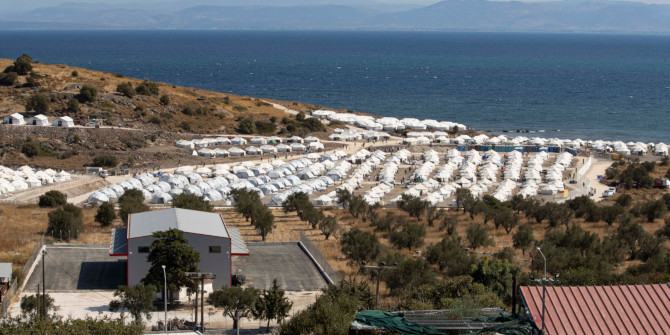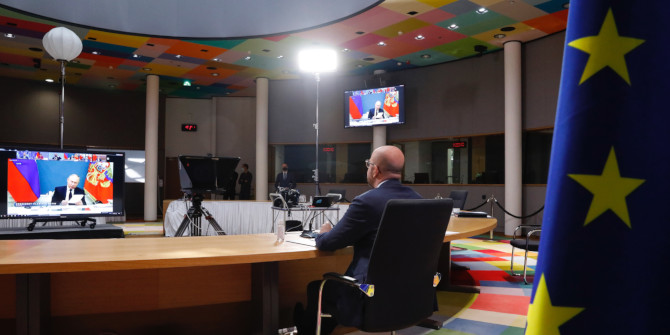

 Many of the protests that took place against Donald Trump during his visit to the UK focused on his policies toward refugees. Amanda Russell Beattie, Gemma Bird and Patrycja Rozbicka argue that while the protesters were right to voice opposition to Trump’s policies, the treatment of refugees at Europe’s borders is just as worthy of criticism.
Many of the protests that took place against Donald Trump during his visit to the UK focused on his policies toward refugees. Amanda Russell Beattie, Gemma Bird and Patrycja Rozbicka argue that while the protesters were right to voice opposition to Trump’s policies, the treatment of refugees at Europe’s borders is just as worthy of criticism.
Donald Trump arrived in the United Kingdom with his usual diplomatic aplomb. On the eve of his visit with Theresa May, and an ensuing tea party with the Queen, his topics of conversation included Boris Johnson’s suitability as PM, the problems of May’s ‘soft-Brexit’ package, and Sadiq Khan’s inability to govern a global city, London.
Across the UK, people were ready to protest not just the man himself, but the policies and politics that have emerged since he took office in January 2017. We have, in the last 18 months, witnessed the eventual upholding of a Global Travel Ban denying certain individuals’ entry to the US; the reinstatement of the Global Gag Rule, an ongoing attack on women, within and beyond the United States, to access contraception, clean and safe abortions; and, we have watched pictures of children, separated from their families, sit in cages as they await their fates as migrants seeking entry into the US. Trump also added, for good measure, that immigration was damaging the culture of Europe.
As Trump was arriving in London, we were conducting fieldwork in the Aegean Islands’ Reception Centres (or hotspots) and reflecting on the emerging similarities. The double walled fences, composed of chain-linked fences and razor wire, are a clear signal of the militarisation of the space that is used to process and register new arrivals. For the most part, our access has been limited to the parts of these spaces people want us to see, and even there the similarities are palpable. On our tour of the spaces set aside for families, vulnerable women, and unaccompanied minors, we sat on one side of several gated spaces, reinforced with large padlocks. This, we were told, was for the safety of the various populations.
Not all the centres have padlocks, but the fences and razor wire remain well manned by Greek Police, the military and G4S. Centres are over-crowded (in one, 3,000 people are present in a space intended for 700) and solutions are difficult to find. It can take over 11 months for a first asylum hearing. One woman landing in June 2018 has her first meeting scheduled for April 2019. And this is just the first stage – often timely appeal processes follow. For those who are awaiting UNHCR assisted transfers to the mainland, they must wait for a space to become available. In the week (2-8 July) leading up to our visit, 638 new migrants arrived on the Aegean Islands. Yet only 299 refugees left the islands, 30 percent of whom were supported by UNHCR. Many new boats carrying men, women, and children keep arriving.
As the protesters against Donald Trump took to the streets, it is worth asking why similar attention is not focused on the inhumane practicalities of EU migration policies. Many hotspots lack adequate laundry provisions and the requisite hot water to wash clothing and linen leading to infestations. A lack of capacities (space and translators) means that new arrivals can sit, in wet clothing, for up to 24 hours waiting to be vetted and registered. We were also told stories of parents sleeping in shifts to keep rats out of tents so that they did not bite their children. We wondered at the trash between the barbed-wire fences. Our conversations confirmed that plastic bottles were used as makeshift toilets and then discarded in the morning. It is a coping strategy of women and girls to avoid being attacked after dark.
In the face of rising anti-immigration politics, a grass roots resistance is emerging. It is one premised on solidarity and a vision of a world which respects human rights, diplomatic co-operation, and open borders, and it is in dire need of greater support. As we travel from island to island and Reception Centre to Reception Centre, stories of solidarity among the volunteers supporting new arrivals on the islands are front and centre.
Yet unlike those we encountered on a previous trip in 2017, the stories of volunteers are tempered with an acknowledgment of being tired and worn down. There is now an open discussion of just how much longer they can continue their support. Accompanying the stories of the volunteers and NGOs are stories of innovation and resilience among the refugee populations that live within and beyond centre walls. In the face of over-crowding and a lack of ISO boxes to house families, we were told of how refugees have wired electricity in makeshift ways so that those beyond the camp walls can charge their phones, their shavers and have light.
This ingenuity is an active embodied resistance to borders, to chain-linked fences, and to razor wire that remains in place, long after the secure demarcations have failed to achieve the containment they so desire. It is a reminder, which ought not be needed, that no one belongs in cages. As Hannah Arendt says, as citizens we must ‘prevent wrong doing because the world in which we all live, wrong doer, wrong sufferer and spectator, is at stake.’ So, we must build on the current momentum that Trump’s visit has galvanised and focus our energies not only on his migration policies, but those in Europe as well.
If not, we will be judged and the European Project that motivates refugees in their darkest hours will be rendered obsolete in the process. Europe is not an innocent bystander, the defender of human rights. We, too, are complicit in the caging of migrants within our own borders, and we must build on the momentum of this current protest to challenge the policies that place adults and children alike behind razor wire.
Please read our comments policy before commenting.
Note: The three authors of this article are currently conducting research as part of the #IR_Aesthetics project co-funded by The Aston Centre for Europe and The University of Liverpool Department of Politics. The article gives the views of the authors, not the position of EUROPP – European Politics and Policy or the London School of Economics. Featured image credit: Bob the Lomond (CC BY-NC 2.0)
_________________________________
 Amanda Russell Beattie – Aston University
Amanda Russell Beattie – Aston University
Amanda Russell Beattie is a Lecturer in Politics and International Relations at Aston University.
–
 Gemma Bird – University of Liverpool
Gemma Bird – University of Liverpool
Gemma Bird is a Lecturer in Politics in the Department of Politics at the University of Liverpool.
–
 Patrycja Rozbicka – Aston University
Patrycja Rozbicka – Aston University
Patrycja Rozbicka is a Lecturer in Politics and International Relations at Aston University.






There was no valid reason to make the perilous journey from Turkey to the Greek Islands. Once these “refugees” entered Turkish soil, they were safe from alleged persecution. I have been to Turkey, and it is a nice country; there was no issue regarding security, culture, or religion for these people to exit Turkey. So it begs the question, were these people seeking to be free of persecution, or were these people looking for freebies offered by Germany, Sweden, France, UK, etc…? They were free of persecution in Turkey, therefore we can presume that the latter was the motivating factor to put themselves and their children in danger.
I don’t mean to make aggressive comments, but this statement is a very silly one. You’re comparing going on vacation to Turkey with people who are stuck in the country with no money, no support, and no hope of leading any kind of normal life. While you were lazing around on a beach or having fun on your iPad making hardline comments about immigration, these people were out there with nothing. Do you think they’re risking their lives crossing the Med just because they don’t like the weather?
For your next trip may I make a suggestion: go out and see how these people are actually living and then see if you can understand why they’re trying to leave.
So you acknowledge that they do not meet the legal definition of “refugee”, being that your statement was that these people have “no money, no support, and no hope of leading any kind of normal life”. Perhaps you would like to change the definition in the Conventions regarding Asylum Seekers, but until then, they are merely “forum-shopping” for the most generous benefits (which is not Greece, another beautiful country).
The thing about making arguments on the internet is you have to be consistent. Your original comment is making the (shall we say “strange” instead of “silly” and be more polite) point that because you found Turkey a nice vacation destination there is “no reason” to make the journey to Greece. I’ve explained to you why people are making this trip and you’ve just shifted the goalposts and started to try and make a legal argument about the technical definition of an asylum seeker (an entirely different argument from what you originally said and I responded to).
This is how we end up going round in circles, for days, talking over the top of each other in some pointless exercise that helps nobody. I’ve made my point: if you don’t understand why people risk their lives going to Greece then you don’t understand their conditions. Stop arguing on the internet and go and learn what these conditions are like and you’ll understand the situation perfectly well.
Perhaps you can read the remainder of the sentence about my time in Turkey that “there was no issue regarding security, culture, or religion for these people to exit Turkey.” So regardless of the reason of my time in Turkey, these “refugees” became safe once entering the Turkish border, thus they lost the status of “refugee” once in a safe country; any travel beyond the safe nation of Turkey makes it an illegal entry.
So whether I was on the beach (as you inferred), or meeting people in Ankara or Istanbul, that is less relevant. The point is that Turkey is safe, and the entry into Greece is that of trespasser.
While ill-spirited and concerning in its lack of empathy, “John from Jersey”‘s comment did hit home on one point: there is little difference between so-called “political” and “economic” migrants. We call the first “refugees”, but the second category includes homeless refugees from Syria trying to feed their children, as well as university students from the EU looking for a job which pays well, and wealthy Americans investing in property. The authors of this article advocate “open borders” as a solution, which is attractive for its equity (treating everyone fairly and equally), and is probably inevitable in the long run (100 years time), but lacks significant public support. Most demographic majorities desire controlled migration – open borders for temporary tourists and the wealthy, somewhat open borders for “genuine” refugees, regulated migration for skilled labour and study and perhaps family reunion, but keeping others out. It’s difficult to know how to operate any satisfactory immigration policy with these constraints, and it only gets more difficult thanks to technology making it easier to cross borders etc. The dissatisfactory outcomes tend to fuel more anti-immigration sentiment rather than support for open borders. I think the EU and US should be thinking more globally about financial and resource transfers to sources of migration to reduce the inequity which results in migration from poorer and disfunctional states to more prosperous ones
The dissatisfaction with the current asylum system is in large part due to the extent of the loopholes used by these people, along with those within our countries who assist and/or overlook these loopholes, resulting in the unintended consequences of millions of non-refugees pretending to be refugees. The long-term damage to our countries will be irreparable, but few in power tend to demonstrate “empathy” or “concern” to the home-grown citizen (just scorn).